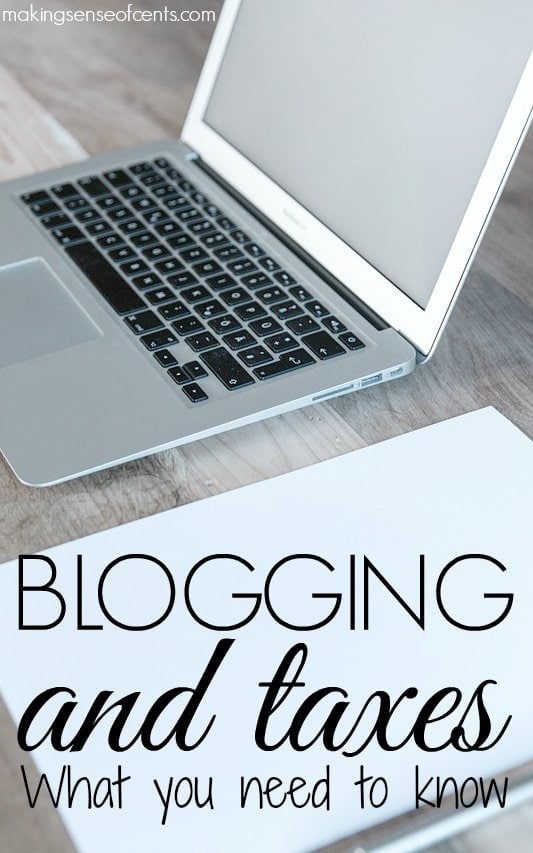 Hello! Today, I have a post from a blog friend of mine. Jackie is a licensed attorney from Pennsylvania. She has been blogging at Jade and Oak for over 3 years, with a focus on helping bloggers build their blogs while keeping it legal. I often receive questions about the law, blogging and taxes so this is a perfect fit. Enjoy!
Hello! Today, I have a post from a blog friend of mine. Jackie is a licensed attorney from Pennsylvania. She has been blogging at Jade and Oak for over 3 years, with a focus on helping bloggers build their blogs while keeping it legal. I often receive questions about the law, blogging and taxes so this is a perfect fit. Enjoy!
I know taxes aren’t the most fun topic.
They can be confusing and boring and just super overwhelming for lots of people. But what if I told you that what you don’t know about taxes might be costing you money?
Let’s dive into what you need to know about taxes as a blogger/freelancer. I promise to keep it light on boring stuff. Also, since tax codes are obviously different all over the world, this information is written with United States tax laws in mind. However, this information can be useful to international readers, regarding how to track your blog earnings.
(P.S. Before we start, I need to add a quick disclaimer. Although I am a licensed attorney, I’m not your attorney. This article doesn’t create an attorney-client relationship and I’m not liable for any losses or damages caused by reliance on the information contained within this article. If you are seeking specific legal or tax advice, consult a professional who specializes in this subject matter in your jurisdiction.)
Blogging and self-employment
So being a blogger (or a freelancer) means you are self-employed. This means that you don’t have a traditional job where your employer would be taking taxes out of your paycheck. But the IRS still wants to be paid of course. This means that you will need to actually pay your taxes yourself.
The US tax system is on a “pay as you go” basis, which is how your employer would be paying your taxes at a traditional job. However, since your taxes aren’t being automatically deducted, it is your responsibility to pay your estimated taxes to the IRS every quarter. If you don’t pay your estimated taxes in a timely fashion, you could actually owe a tax penalty.
However, you might not actually owe the estimated taxes if you didn’t have any tax liability the previous year or you don’t expect to make a profit of a least $1,000 from blogging that year. Additionally, you don’t need to report your self-employment earnings until your net income is at least $400 (meaning you have a profit of $400 after you deduct your expenses).
Whether you are making money yet from your blog, now is the perfect time to start tracking everything – money spent and money earned. This will just help you out down the road if/when you need to start filing taxes.
Related articles:
- My Monthly Online Income Reports Where I Show You How I Earn Over $30,000 A Month
- How To Start A Blog On WordPress
- How To Make Money Blogging
So, what is self-employment tax exactly?
In a typical job, you and your employer would be both paying Social Security and Medicare taxes. However, if you are self-employed, it is actually up to you to pay both of these portions – the share you would’ve made as an employee and the employer’s share.
This makes sense since, when you’re self-employed, you are basically your own boss. That’s why you get stuck paying both portions or basically double what you would normally expect to pay. Even if your self-employment income isn’t your sole income, you have to pay this tax. For example, if you have a full-time job and your blog is a side hustle, you still need to cough up that self-employment tax.
A nice thing about this tax is that you actually get a personal tax deduction for paying it. This will lower your adjusted gross income which lowers your tax liability.
Filing taxes as a blogger
So now let’s get into what you need to actually file and report to the IRS. You will file a few extra forms along with your personal tax return – Schedule C is the self employment form and Schedule SE is the worksheet that helps you calculate your taxes.
You file these forms just as you would with your typical personal tax return – you can use traditional paper forms or use a software program. If you are feeling confused or want some extra help, you can also work with a tax specialist, who can also help ensure that are you taking advantage of all the possible deductions.
Tax deductions for bloggers
Just like with any other personal business, bloggers are able to claim losses on their tax return. The IRS understands that it is common for most businesses to take a loss for their first year or more. If you have actually lost money (meaning your expenses were more than the money coming in), you can claim that loss on your tax return.
If you have another job, this loss can be applied against the earnings of your other job and result in a lower adjusted gross income. This translates into a lower tax liability for you.
This is where knowing how to do your taxes is really important. There are lots of deductions out there for small business owners and those of us who are self-employed, like bloggers. The IRS allows deductions that are considered “reasonable and necessary” to your work. With blogging, these expenses can include money spent on things such as:
- Advertising,
- Supplies,
- Office furniture,
- Electronics, and
- Goods/services related to your business.
For example, if your office is a room in your home, you may be able to deduct some household expenses, such as rent and utilities. There is a formula for calculating this amount and most tax software should be able to help you calculate this.
You are also able to deduct the cost of using cell phones, cameras and computers as these are business assets. However, this can get a little complicated since these can be considered depreciable assets and there will be another formula you’ll need to figure these out. It will also depend whether you are solely using these items for just blogging or also for personal use.
You can also include educational expenses (such as an online course about blogging) and software or programs (like a Mail Chimp account or PhotoShop) if those are related to your blog. Other online expenses related to your blog are also deductible, such as your web hosting fees, domain name expenses, WordPress plug-ins and themes, virtual assistant fees, graphic design and even a portion of your monthly internet bill.
Remember, the key is that you can deduct expenses that are “reasonable and necessary.” You don’t want to shortchange yourself by not deducting legitimate expenses. However, consider whether the expenses really were business related before you claim them on your taxes.
What if my blog is just a hobby?
So if your blog is actually considered to be a “hobby” by the IRS, then you actually can’t use any deductions. The above discussed deductions are related to a business and not a hobby. If you want to try to say your blog is a business, rather than a hobby, in order to take advantage of tax deductions, the IRS will look at several factors to decide on this.
- Some of these factors include:
- Whether you earned a profit (if you made a profit in at least 3 of the most recent 5 tax years, the IRS is more likely to qualify it as a business)
- The amount of time and activity you put into your blog
- Whether you rely on an income from your blog
- If you can reasonably expect to make profits in future years
Basically, if you aren’t making money off of your blog but are saying that it’s a “business” so you can get the tax benefits, the IRS isn’t going to like that. Be sure to be honest with the IRS (and yourself) about the purpose of your blog.
So there you have it – what bloggers need to know about taxes. This is a huge topic so of course I wasn’t able to cover everything on this topic but hope that this was a great start.
Author bio: Jackie is a licensed attorney from Pennsylvania. She has been blogging at Jade and Oak for over 3 years, with a focus on helping bloggers build their blogs and keep it legal. As an attorney and blogger, she is helping bloggers not make legal mistakes with their blogs. When she isn’t blogging, she enjoys spending time with her husband, Jarrod, and their two snuggly pugs, Bowie and Rosie.
Do you have a blog? What legal questions about blogging and taxes do you have for Jackie?


Leave a Reply